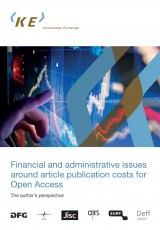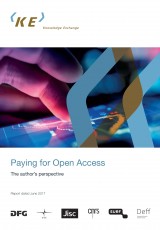
When authors select a journal to publish their article, they have plenty of choice:there are about 34,500 scholarly peer-reviewed journal titles, one third of which are now Open Access (OA) journals. Do OA-aspects play a role in the selection of journals by authors? And if so, for which reasons? And if Article Processing Charges (APCs) apply, how do they pay for these costs?
To share a better understanding of author's perspectives on APC payments, Knowledge Exchange has carried out a study among authors of six research organisations in the UK, France, Germany, Finland, Denmark, and the Netherlands. These organisations were very actively engaged which led to a total of 1069 authors participating in online surveys focused on their 2015 articles published in OA journals or in hybrid journals.
The main results that are relevant for this study are:
- OA aspects in journal selection: In about one-third of the cases, authors of articles in OA-journals indicated that OA aspects did play an important role in the journal selection process'. In a similar proportion of the cases, OA aspects did not play a role in the journal selection of those articles that were eventually published in OA journals.Here, the match between article and journal appear to have played the primary role, while the fact that the outcome of the selection process was an Open Access journal was not seen as important by the authors.
- Reasons for OA publishing: Two practical reasons for OA publishing top the list: more exposure and a wider audience for the article and complete freedom to reuse, republish, and distribute the article. However, the more ideological reason to support for Open Access /Open Science was also a much-cited reason. In contrast, requirements by research funding organizations, universities and/or research evaluation exercises played primarily a role among the UK authors and much less among the authors of the participating research organisations in the other countries. This is clearly an effect of the stricter policies in the UK in this regard.
- APC- payments:Author-controlled discretionary funds (research grants and/or budgets of their research units) are especially used if there is no APC-fund available or if the fund does not fund OA articles in hybrid journals.
- OA articles in hybrid journals: The percentages of OA articles in hybrid journals are lower than 5% in those institutes where the authors themselves select this OA option and thus pay for the APC involved. However, the total percentages of OA articles in hybrid journals are above the 10% level at two universities with offsetting deals (the Technical University Eindhoven), or with a combination of offsetting deals and funding of APCs for articles in hybrid journals (University of Glasgow).
The outcomes of this study also point to three areas where more, and more streamlined, support for authors is needed. These three areas are:
- Financing APCs: Different rules and complex conditions can make it difficult for authors to find ways to fund the APC for their article, even if there is funding available.Stakeholders such as libraries can play an important role here, as demonstrated by the popularity of APC-funds they manage.
- Administrative procedures for APCs: Considerable percentages of researchers stated that their administrative efforts to pay APCs took them more than 1 hour. Clearer, more streamlined administrative procedures within the research organisations would greatly help the authors involved.
- Communication about OA publishing: Another result shows that authors use a mixture of communication channels about Open Access and the use of terminology often differs greatly among the various channels. Again, we see here a clear task for libraries to provide clear communication to authors and to take the lead in the development of simple, harmonised terminology on Open Access.
The abridged report 'Paying for Open Access the author's perspective' and the complete results of the study including references to relevant literature 'The financial and administrative issues around article publication costs for Open Access: the author's perspective' are available to download below.








